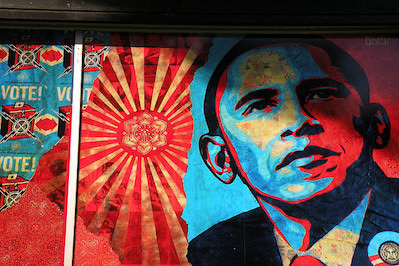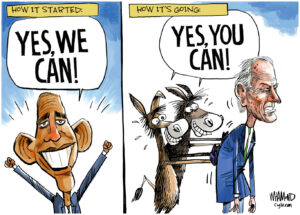Obama Acknowledges Future Presidents May Wage Perpetual, Secret Drone War
The president agrees with one of the most significant critiques of his drone war: that its precedent could encourage future presidents to engage comfortably in perpetual covert wars “all over the world" -- just as he did.
Michael Pittman / CC BY-SA 2.0
In an interview with New York Magazine’s Jonathan Chait, President Obama agreed with one of the most significant critiques of his drone war, that its precedent could encourage future presidents to engage comfortably in perpetual covert wars “all over the world” — just as he did.
As Obama put it, his precedent risks creating “institutional comfort and inertia with what looks like a pretty antiseptic way of disposing of enemies.” He said he looked at “the way in which the number of drone strikes was going up and the routineness with which, early in my presidency, you were seeing both DOD and CIA and our intelligence teams think about this. … And it troubled me, because I think you could see, over the horizon, a situation in which, without Congress showing much interest in restraining actions with authorizations that were written really broadly, you end up with a president who can carry on perpetual wars all over the world, and a lot of them covert, without any accountability or democratic debate.”
At The Intercept, Ryan Devereaux and Alex Emmons report that “the alarming changes that Obama describes as over the horizon are already here.”
“What’s so interesting is that President Obama acknowledges this problem — that future presidents will be empowered to kill globally, and in secret. What he doesn’t acknowledge is how much of a role his administration had in making that a bizarre normal,” Naureen Shah, director of national security and human rights at Amnesty International, told The Intercept.
“There is something so strange about the person who many would say is very responsible for this situation actually acknowledging it and saying he tried to plan for it,” Shah added. “What we’ll be left with from the Obama administration is a far more dangerous precedent of secret, global killings than what we started with.”
From the very beginning of his presidency, Obama tightly embraced legal arguments, including the “state secrets privilege,” to deflect inquiries into the government’s use of lethal force in foreign countries; he fought vigorously for years to keep his rationale for assassinating an American citizen secret; he never explained how the U.S. came to kill that same American citizen’s 16-year-old son; and he has never once forced his premier intelligence agency to publicly answer for the deaths of non-Western civilians — of which there have been many — during an eight-year covert bombing campaign.
In the New York magazine interview, Obama gave human rights groups and “the left” credit for pushing him on issues of transparency in targeted killing — but at the same time indicated they had little impact on his own decisions.
“I’m glad the left pushes me on this,” Obama said. “I’ve said to my staff and I’ve said to my joint chiefs, I’ve said in the Situation Room: I don’t ever want to get to the point where we’re that comfortable with killing. It’s not why I wanted to be president, to kill people.”
“Do I think that the critiques are fair or fully informed?” the president went on to say. “Not always. Sometimes they are. Much of the time they’re not. To give you the most basic example: People, I think, don’t always recognize the degree to which the civilian-casualty rate, or the rate at which innocents are killed, in these precision strikes is significantly lower than what happens in a conventional war.”
.
—Posted by Alexander Reed Kelly
As we navigate an uncertain 2025, with a new administration questioning press freedoms, the risks are clear: our ability to report freely is under threat.
Your tax-deductible donation enables us to dig deeper, delivering fearless investigative reporting and analysis that exposes the reality beneath the headlines — without compromise.
Now is the time to take action. Stand with our courageous journalists. Donate today to protect a free press, uphold democracy and uncover the stories that need to be told.






You need to be a supporter to comment.
There are currently no responses to this article.
Be the first to respond.